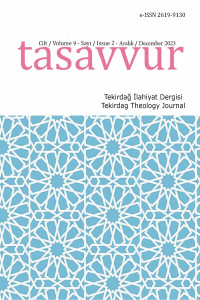Abū Dhu’ayb al-Khudhalī and His Elegies: The Case of His Elegy to His Sons
Abū Dhu’ayb al-Khudhalī and His Elegies: The Case of His Elegy to His Sons
Author(s): Esat AyyıldızSubject(s): Language studies, Other Language Literature, Theory of Literature, Sociology of Literature
Published by: Tekirdağ Namık Kemal Üniversitesi İlahiyat Fakültesi
Keywords: Arabic Language and Literature; Abū Dhu’ayb al-Hudhalī; Elegy; Classical Arabic Poetry; ‘Ayniyya of Abū Dhu’ayb;
Summary/Abstract: In the vast expanse of classical Arabic literature, the works of Abū Dhu’ayb al-Hudhalī stand out, particularly his elegies, which provide a profound glimpse into the sociocultural dynamics of his era. The research presented in this article delves deep into the life and artistry of Abū Dhu’ayb, meticulously examining how his personal experiences and surroundings shaped his poetic expressions. Elegies, often characterized by their mournful tone and reflective nature, become especially significant in Abū Dhu’ayb’s repertoire as they offer poetic lamentations and provide insight into the world in which he lived. The subject of this research focuses on Abū Dhu’ayb’s elegies, providing an in-depth literary analysis, and aiming to discern the intricate interplay between his life’s events and his poetic manifestations. By situating Abū Dhu’ayb’s elegies within the broader canvas of classical Arabic poetry, this research seeks to shed light on their distinct characteristics, thematic concerns, and stylistic nuances. Within the scope of this article, special attention is given to his deeply moving elegy dedicated to his sons. Drawing from a wide spectrum of his poems, we ensure a comprehensive understanding of Abū Dhu’ayb’s unique approach to the art of elegy. The rationale for this inquiry becomes particularly salient when we position Abū Dhu’ayb within the milieu of his literary peers. Although numerous poets of his era ventured into the domain of elegy, Abū Dhu’ayb’s compositions stand apart, characterized by their intimate resonance and the intricate threads of narrative woven seamlessly into his poetic tapestry. Engaging with overarching themes of fate, destiny, honor, and the human condition, his works do more than just lament the loss of loved ones or ponder the transient nature of life. Through this research, we aim to elevate the understanding of Abū Dhu’ayb’s contribution to Arabic literature and underscore the importance of his elegies as both literary masterpieces and historical documents. The primary purpose of this study is twofold. Firstly, it seeks to explore the artistic depth and breadth of Abū Dhu’ayb’s elegies, understanding their thematic richness and linguistic excellence. Secondly, the study aims to draw connections between the poet’s life - a life replete with its share of joys, sorrows, triumphs, and tribulations - and the elegies he crafted. By doing so, the research offers a holistic view of the poet, not just as a literary figure but also as a person deeply affected by the world around him. The methodological framework employed in this research is rooted in both literary analysis and historical contextualization. By closely reading Abū Dhu’ayb’s elegies, the research deciphers their symbolic and metaphorical elements, laying bare the poet’s craft. Concurrently, by positioning these elegies within their historical context, the study provides a broader understanding of the socio-political and cultural milieu of Abū Dhu’ayb’s era. This dual approach ensures a well-rounded exploration, enabling readers to appreciate the elegies both as individual pieces of art and as part of a larger poetic tradition. The research methodology used in this study involves a combination of literary analysis and historical contextualization.
Journal: Tasavvur Tekirdağ İlahiyat Dergisi
- Issue Year: 9/2023
- Issue No: 2
- Page Range: 1407-1436
- Page Count: 30
- Language: English

